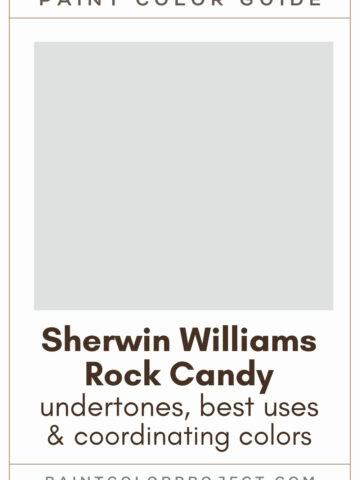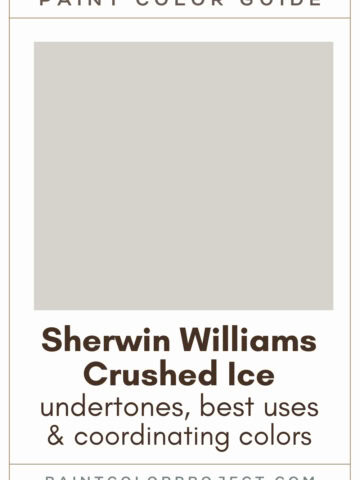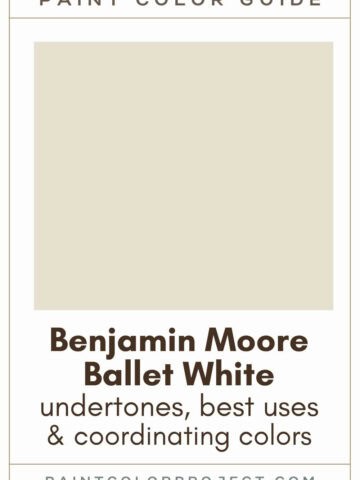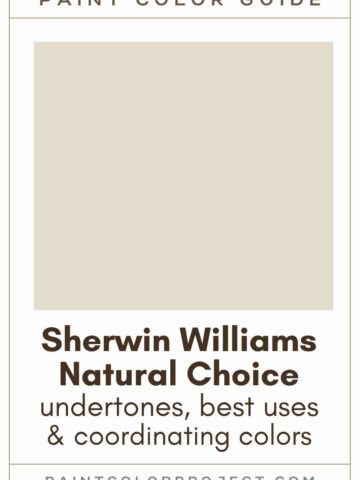Need a warm neutral paint color for your home? Today, let's look at Benjamin Moore Baby Fawn to see if it’s a good fit.
Warm neutrals have become really popular lately. I totally get why. They're soft and inviting, without feeling too plain or cold.
The beauty of these neutrals is that they're versatile. You can pair them with almost any style of furniture or decor.
One of my absolute favorite warm neutrals is Benjamin Moore Baby Fawn, also called Edgecomb Gray. I've used it myself, and it's easy to see why so many people love it.
Let’s take a look at exactly what makes this color so special.
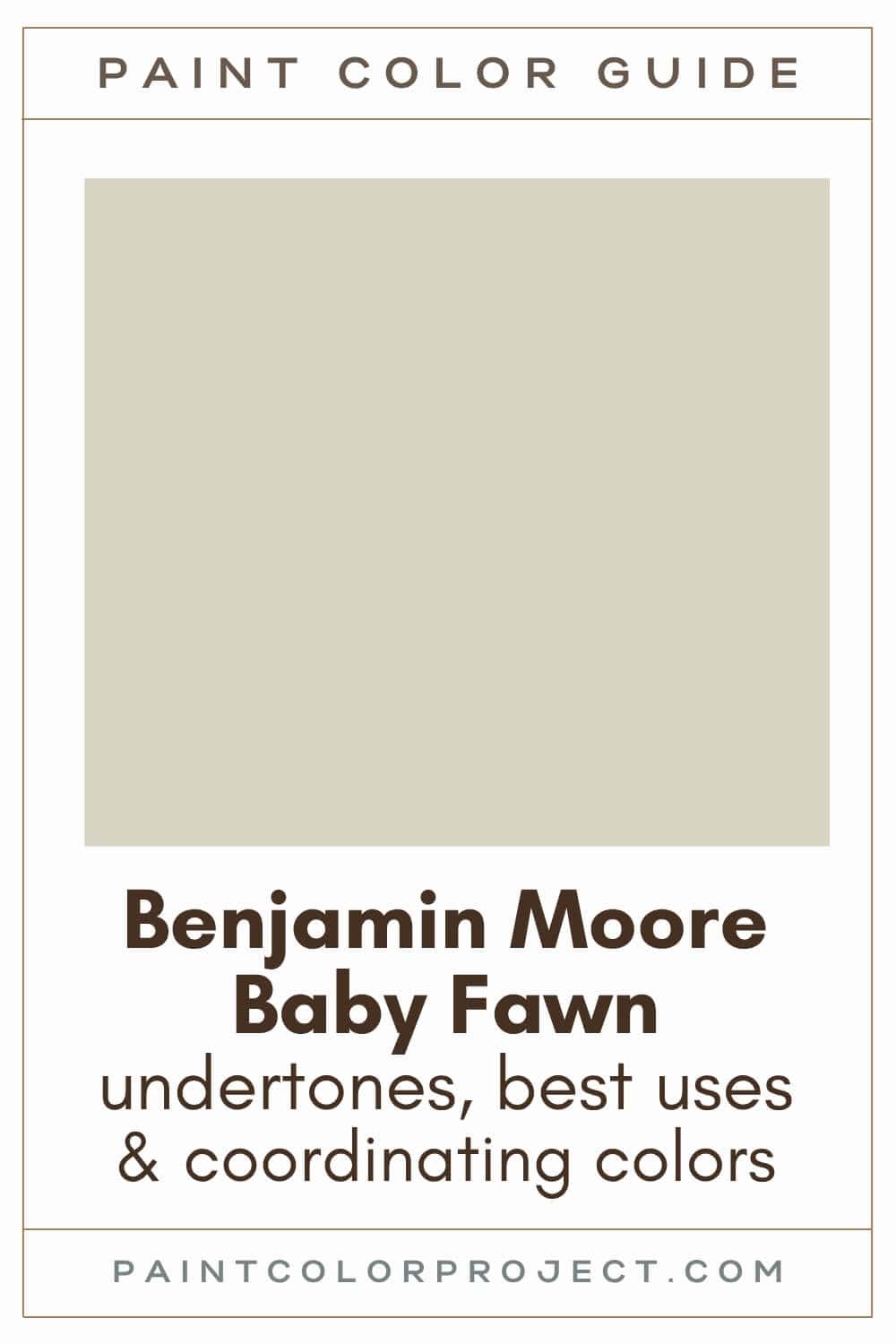
Baby Fawn, Benjamin Moore, OC-15
Baby Fawn is a warm, cozy neutral that lands somewhere between off-white and greige.
Some people even describe it as taupe. I love how it feels inviting yet still elegant.
Click here to get a peel and stick sample of Baby Fawn
Color Family
Baby Fawn belongs to Benjamin Moore's white family.
Light Reflectance Value
63
Light Reflectance Value (LRV) measures how much light a paint color reflects. The scale goes from 0 (pure black) to 100 (pure white).
Baby Fawn has an LRV of 63, which is a bit darker than you might expect for an off-white or greige.
RGB Colors
R: 218 G: 209 B: 196
RGB values tell you how much red, green, and blue are mixed together to create the paint color. Each color value ranges from 0 to 255.
Hex Code
#D9D3C4

Undertones
Baby Fawn is a warm neutral with beige and warm gray undertones. There's also a subtle hint of green in there. Unlike similar colors, Baby Fawn doesn't have any noticeable violet undertones.
In sunny, south-facing rooms, Baby Fawn shows its warmer side. It looks soft and beige without getting overly yellow.
In cooler north-facing rooms or areas without much natural light, it appears greige or even slightly gray.
One quick tip from experience: if your room is super dark or doesn't have windows, Baby Fawn can seem a bit muddy. It’s always smart to test paint samples on your walls to see how they look through the day.
Click here to get removable peel and stick paint samples for easy testing.
Best Uses
Baby Fawn is a versatile paint color that works beautifully in just about any space. It’s warm, neutral, and interesting enough to keep things from looking plain.
Because it’s so easy-going, Baby Fawn can be a great whole-house paint color.
I especially like Baby Fawn for:
- Bedrooms, if you want them to feel warm and welcoming.
- Kitchen cabinets, paired with white walls.
- Living rooms, to create a relaxed and comfortable vibe.
- Furniture pieces, if you're repainting something special.
- Home exteriors, for a cozy and classic look.
But definitely test it first. Colors can change a lot depending on your lighting, so always check a sample in your home before you fully commit.
Similar Colors
- Benjamin Moore Elmira White
- Behr Canvas Tan
- Sherwin Williams Dumpling
- Benjamin Moore White Sand
- Behr Clay Beige
- Sherwin Williams Taupe of the Morning
- Benjamin Moore Jute
Click here to get a peel and stick sample of Baby Fawn
🤯 Too many color choices?
Download my free Paint Color Planning Quick Start Guide — it’s the exact method I use to help readers choose a color that works the first time.
📥 Grab it here!
Coordinating Colors
Baby Fawn is one of those warm neutrals that goes well with nearly everything. It pairs beautifully with blues, greens, grays, oranges, browns, bright whites, off-whites, and other rich, warm neutrals.
Dark blue-grays:
- Philipsburg Blue
- Normandy
- Stillwater
- Thousand Oceans
- Alfresco
Off-whites:
- Seapearl
- Glacier White
- Dove Wing
- Soft Chamois
- Cloud Cover
Dark orange-browns:
- Brentwood
- Antique Copper
- Toasted Pecan
- Mountain Retreat
- Ten Gallon Hat
Trim Colors
When choosing trim for Baby Fawn, you can go two ways: bright white or soft white.
Bright white trim gives you a clean, crisp contrast. It also brings out Baby Fawn’s creamy warmth.
Here are a few bright white trim colors I like:
- Benjamin Moore Simply White
- Sherwin Williams Extra White
- Behr Ultra Pure White
If you prefer a softer look, pick a warm or creamy white for your trim. You’ll still get some contrast, but it’ll feel more gentle and subtle.
Baby Fawn Paint Color Palette
Want to use this paint color in your home? Instantly upgrade your home's aesthetic with our exclusive paint color palette. Unlock the perfect trim color and six stunning accent colors, a combination of neutrals and bold hues for an instantly harmonious space!
Get your perfect paint color palette by clicking here!

Click here to get a peel and stick sample of Baby Fawn
FAQs
Here are answers to some common questions about Baby Fawn.
Is Baby Fawn warm or cool?
Baby Fawn is definitely a warm neutral. It hits the sweet spot between off-white and greige.
In rooms with lots of sunlight (especially south-facing ones), Baby Fawn looks warmer and beige. In darker or north-facing rooms, it feels cooler and more greige or gray.
Does Baby Fawn look green or purple?
Baby Fawn is pretty neutral, though it does have a tiny bit of green hiding in there. You might notice that subtle green in certain lighting.
But unlike many other greige colors, Baby Fawn won’t ever look purple or violet.
What is the undertone of BM Baby Fawn?
Baby Fawn has warm gray and beige undertones, with just a hint of green. There’s no violet undertone like you might find with similar colors.
In bright rooms, Baby Fawn tends to look warmer and soft beige, without getting yellow. In darker spaces, it appears cooler and more greige.
Is Benjamin Moore Baby Fawn the same as Edgecomb Gray?
Yes, Baby Fawn and Edgecomb Gray are exactly the same color. Benjamin Moore just gave it two names.


What's the difference: BM Pale Oak vs Baby Fawn?
Pale Oak and Baby Fawn look super similar at first glance. Both are warm neutrals with gray undertones.
The main difference is that Pale Oak is lighter (LRV 69), while Baby Fawn is a bit darker (LRV 63). Baby Fawn is also a little warmer and more saturated, whereas Pale Oak feels slightly softer.
From experience, these two colors can be tough to tell apart on a wall. Swatch both to see which one looks better in your space.

What is one shade lighter than BM Baby Fawn?
Gray Mist is one shade lighter than Baby Fawn, with an LRV of 73 compared to Baby Fawn’s 63.
If you love Baby Fawn but want something lighter, Gray Mist is worth checking out. Pale Oak and Fossil are other good options to consider.




What's the difference: BM Cedar Key vs Baby Fawn?
Cedar Key and Baby Fawn are both warm neutrals, but they have distinct differences.
BM Cedar Key is a crisp beige with taupe hints. It has warm orange undertones mixed with some pink-taupe. Baby Fawn, on the other hand, leans more toward greige with warm beige and gray undertones and a subtle green hint.
Cedar Key feels slightly darker (LRV 61) and leans orange, while Baby Fawn (LRV 63) leans more yellow and muted.
Always test both colors side by side in your home — I found that's the best way to choose between colors that are similar.


What's the difference: BM Balboa Mist vs Baby Fawn?
Balboa Mist is a pale gray with warm beige and subtle violet undertones. Baby Fawn is warmer, balancing between off-white and greige, with gray, beige, and subtle green undertones.
Balboa Mist is lighter (LRV 65) and more muted, while Baby Fawn is slightly darker (LRV 63) and more saturated.
If you can't decide, try painting samples of both colors in your space. It's surprising how different they'll look once they're actually on your wall.


Is BM Baby Fawn still a popular paint color?
Even though greige isn’t as trendy as it was a few years ago, Baby Fawn still has plenty of fans — especially realtors. It’s one of those timeless neutrals that work well pretty much anywhere.
Before you go...
So, you've found the perfect paint color, but here's the thing — there's another big decision you have to make: picking the right paint sheen. Seriously, the level of glossiness can totally change how your color looks on the walls and how long the paint lasts!
Check out our complete guide to understanding paint sheens.
Still unsure which paint color is right for your space?
Choosing paint doesn’t have to be stressful! My free Paint Color Planning Quick Start Guide walks you through the exact steps to confidently choose the perfect color — without the overwhelm, second-guessing, or endless swatch testing.
👉 Click here to download the free guide!
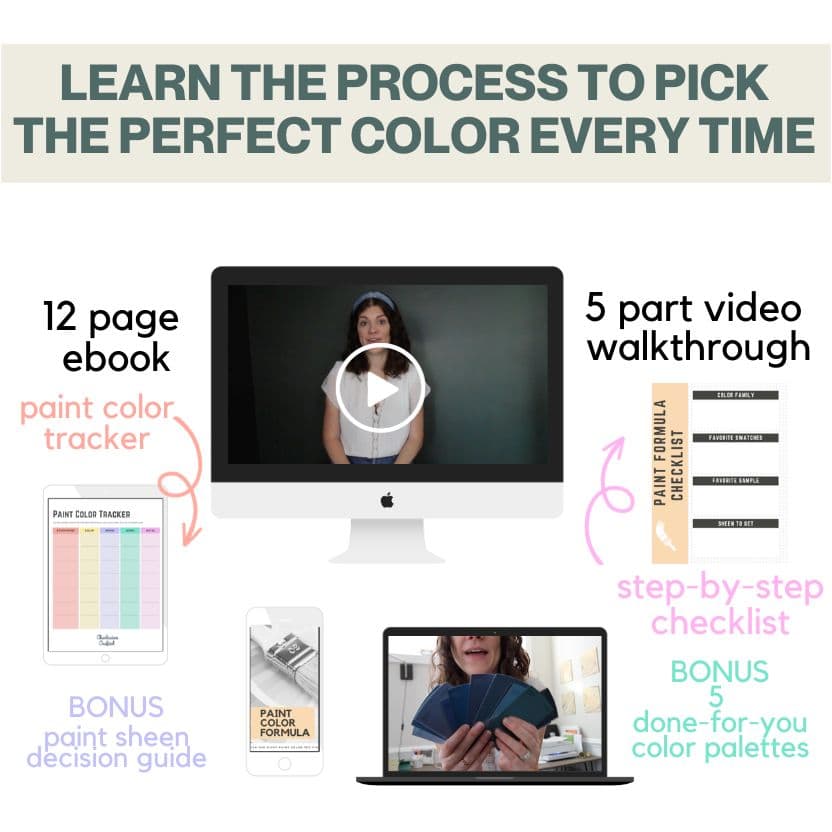
My Paint Color Formula course walks you through the painless process of expertly testing paint swatches to ensure you have the perfect color for your home.
The best way to sample paint? Samplize!
Get peel-and-stick removable and reusable paint samples here!
Thanks for reading!

Meg Hemmelgarn is a freelance writer and home decor + DIY blogger who loves to talk about paint colors. She and her husband are currently renovating their third fixer upper. You can see their projects on her blog, Green With Decor.

